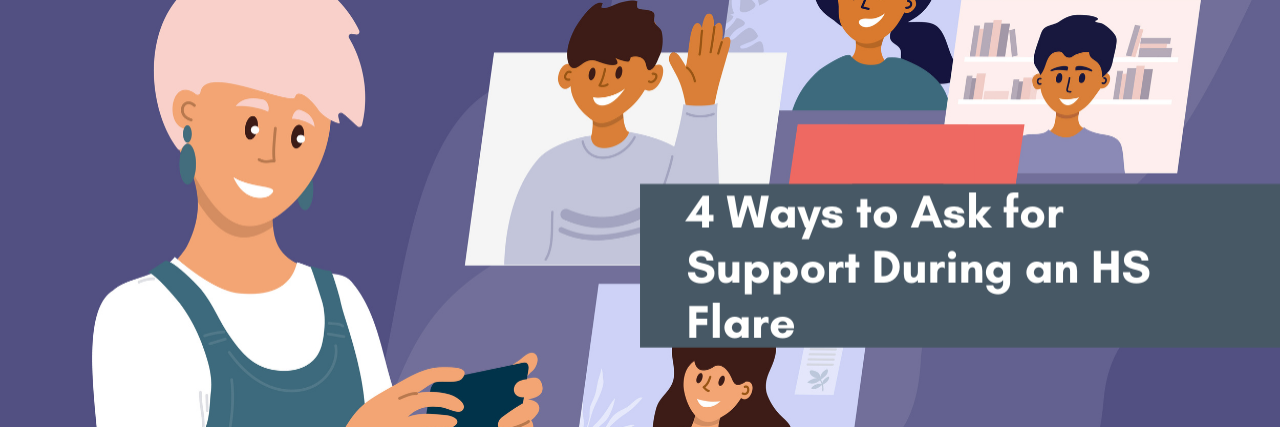Life with a chronic illness like hidradenitis suppurativa (HS) can be unpredictable and overwhelming. I never know what my day is going to look like because a flareup can happen at any time. Will I be able to get through work today? Will I make it to my friend’s dinner? Will I even be able to get out of bed and walk?
So many of us mask our pain and power through the day as best we can. I waver between trying to hide my illness and feeling like I need to show others how sick I am. This is because asking for help is a challenge. I worry my loved ones will get sick of me or see me as a burden. Sometimes I’m not even sure how they can help. Well, here are four ways I’ve learned to ask for help and support from the people in my life.
Start a group text with a few close people who live both close by and farther away.
When I realized it was time to ask for some help with my HS, I thought about who I would be comfortable reaching out to. I considered things like: Do they know about my HS? Do I feel comfortable with them? I then drafted a text and shared that my HS was getting worse, and I could use some help and support from them. I asked if they would be okay with me reaching out when I needed something. I then acknowledged that everyone has a lot going on in their own lives, so I would text the group to see who is around.
Doing it this way doesn’t put everything on one person. I also knew that these people were willing to help, so I didn’t have to feel anxious every time I reached out. I suggest including loved ones who are in the same city or area as you, in case you need physical help. I also think it’s important to include family or friends who don’t live nearby, if possible. They can help with emotional support or just check in on you. I know that when I’m feeling defeated or depressed, I can call my mom or a friend from college for a pick-me-up.
Be specific with your requests.
I am only just learning how to be specific in what I need. Before I would just ask for general support and help, and it would usually be met with crickets. This would make me feel like my loved ones didn’t care. Couldn’t they just know what I need? I remember being in a therapy session, and my therapist said, “I’m not a mindreader, Allyson. You need to tell me if something is bothering you or you’re upset with me.” I learned that many people don’t know how to help. They don’t want to intrude or do something wrong.
After that realization, I started asking for specific favors. Here are a few examples:
- Can someone drive me to my doctor’s appointment?
- Is anyone available to drop off a meal? I can barely walk today, let alone go shopping or make anything.
- I’m feeling sad today and could use someone to talk to.
- Can someone come over and keep me company? I’m in a lot of pain but would love to watch a movie or something.
- Is anyone free to pick up some meds for me?
- I just had surgery and need some help changing the dressings.
- Can anyone walk Petey (my dog) for me today?
It was so hard at first. What if they say no? Does this mean I asked for too much? And yes, there were times when no one responded or was available. It’s hard not to take it personally and that’s a totally valid feeling. It’s vulnerable to put yourself out there and ask for help, but it doesn’t mean they don’t care about you. Don’t let it discourage you from reaching out again.
Keep a list of individuals who can help with different things.
I have a mental list in my mind of who is best for what. Sometimes people can only help with certain things, so it helps to remember what they are. One of my friends loves to cook, so she brings me meals sometimes. Another friend doesn’t work during the day, so he’s available to drive me to appointments. Having a virtual movie night with my family is fun and helps to distract myself from the intense pain. I can just be myself.
Don’t apologize.
This is an important one: Don’t apologize when asking for help. Everyone needs help at one time or another, whether they’re sick or not. Having a chronic illness is a full-time job, and It can feel impossible to handle on your own. You don’t need to say sorry for something that isn’t your fault and out of your control. We didn’t ask to be sick.
Just know this: You deserve support and help. You just have to find the right people, and sometimes they are in unexpected places. Maybe one of your people is someone you met in an online support group or on social media. Maybe they have a chronic illness too. A newer friend, whom I met in another support group, is so good with checking in via text. I didn’t expect this at all, but it was a welcomed surprise.
Keep fighting, HS warriors. But you don’t need to fight alone.

